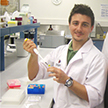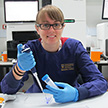Related Questions
- Is there are cure for everything?
- Do you know about the 'alice in wonderland" disease? illness? im not really sure what it is, but do you know of a cure?
- There are bugs in Canada that bite into the trees & kill them! :( Is there any way you can stop this and help these
- why is watermelon pink ?
- Is it possible that allergies can fade or go away? How?









I’m not sure smarter is the right word, as diseases aren’t sentient and intelligent life froms, but I get what you mean, it’s what I have worked on the last 10 years of my life. Why is it that just as science creates one treatment, another treatment for another disease seems to begin failing?
I think the simplest answer is the way we are designing drugs. or rather, how we WERE designing drugs. Most of the medicines on the market now were developed many years ago, before we had the understanding we do now. They were simply the first ideas that worked, not necessarily the best. and unfortunately, many disease causing agents such as cancer cells, bacteria, and virii are dynamic, and capable of changing to adapting to their environment, in fact often far better than humans do with theirs. Many have genes that are inactive but can be upregulated when exposed to drugs.
My hope is that as we understand these disease causing agents, that our drug designs are becoming smarter too, targeting aspects that aren’t readily capable of change. We have seen success with this in the form of new vaccines which are slowly creating a host population they can’t infect which will eventually eradicate the virii as they need a host to survive.
Scientists here in Aus are working to prevent malaria parasites from infecting mosquitos, which are necessary to transmit the parasites to humans. We ARE thinking smarter, but it takes longer to develop. Hopefully we win the race. I know I’d bet on us.
0
I agree with Miranda, I’m not sure smarter is the right word. It is hard to predict what new diseases so as scientists we are always playing catch up. But the more we learn about how our cells work, it will give us a heads up with a new disease emerges!
0
Infectious pathogens have only two aims in their life (unlike us): 1)to survive, 2) to reproduce. For instance when we attempt to eliminate them using antibiotics, most of them die but survivors actually gain resistance to the antibiotic and continue reproducing. Then we try another antibiotic on them, again most will die but there will be some survivors which gain resistance and continue living on.
Have you read Alice in Wonderland, Misszombie? If you haven’t let me briefly explain a talk between Alice and the Red Queen which I will later use to explain your question:
“Well, in our country,” said Alice, still panting a little, “you’d generally get to somewhere else — if you run very fast for a long time, as we’ve been doing.”
“A slow sort of country!” said the Queen. “Now, here, you see, it takes all the running you can do, to keep in the same place. If you want to get somewhere else, you must run at least twice as fast as that!”
So what red queen tells Alice is that if she just runs at her normal speed, she would be remaining in the same spot. If she wants to move, she needs run twice as fast.
Coming back to your question, we use a hypothesis called “Red Queen Hypothesis” to explain what you describe as “diseases becoming smarter than cures”. Red Queen Hypothesis says that organisms must constantly adapt, evolve, and proliferate simply to survive against ever-evolving opposing organisms in an ever-changing environment. Therefore infectious pathogens need to run twice as fast to survive against cures so that they can live.
0